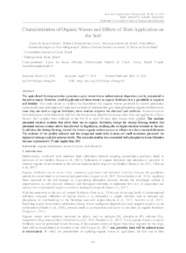Characterization of organic wastes and effects of their application on the soil.
Characterization of organic wastes and effects of their application on the soil.
Author(s): OLIVEIRA, L. de S.; COSTA, M. C. G.; SOUZA, H. A. de; BLUM, J.; ALBUQUERQUE, G. H. da S.; ABREU, M. G. P.; MAIA, D. de S.
Summary: The agricultural farming activities generate organic waste whose indiscriminate deposition can be prejudicial to the environment. However, careful application of these wastes as organic fertilizers it is a possibility to improve chains in the semi-arid region of Ceará have contents of nutrients that give them potential as organic fertilizers and, since they are used as organic fertilizers, these residues improve the chemical soil attributes...
Publication year: 2018
Types of publication: Journal article
Unit: Embrapa Mid-North
Keywords: Adubação orgânica, Química do Solo, Reutilização de resíduos
Observation
Some of Embrapa's publications are published as ePub files. To read them, use or download one of the following free software options to your computer or mobile device. Android: Google Play Books; IOS: iBooks; Windows and Linux: Calibre.
Access other publications
Access the Agricultural Research Database (BDPA) to consult Embrapa's full library collection and records.
Visit Embrapa Bookstore to purchase books and other publications sold by Embrapa.

